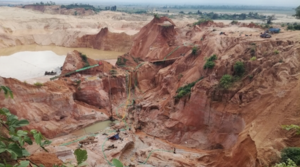Valentina Ruiz Leotaud | February 16, 2020

Gold panning. (Reference image by Jean-François Gornet, Wikimedia Commons).
A study by researchers at the National University of Singapore found that increased enforcement and the offer of an alternative agriculture-based livelihood are unlikely to deter illegal gold miners in Myanmar.
“It is simply too profitable,” they wrote in a paper published in the journal Conservation Science and Practice.
Even though Myanmar is known as the world’s largest producer of jade, gold mining -and illegal gold mining in particular- has been growing in recent years. This situation has pushed the government to launch a series of initiatives to drive people away from unregulated operations.
THE IMPORTANCE OF MINING TO MYANMAR’S ECONOMY IS EXPECTED TO INCREASE FOLLOWING THE OPENING OF THE COUNTRY TO GLOBAL INVESTMENT AFTER POLITICAL REFORMS WERE LAUNCHED IN 2011
But NUS scientists were curious about the costs imposed by enforcement, the level of enforcement required to make informal gold mining unprofitable, and the potential benefits associated with alternative agriculture-based livelihoods. Thus, they interviewed 226 people involved in the gold mining industry in the Homalin township in northern Myanmar. These miners operate along the Chindwin River and the Uru River basins, many on sites abandoned by the formal sector.
The idea behind the survey was to understand their motivation to participate in mining, assess the profitability of informal mining, and estimate losses associated with law enforcement. Participants included mine owners and workers in both the formal and informal sectors and local farmers.
The researchers found that while police inspections impose costs associated with wasted time and loss of equipment, informal gold mining is so profitable that miners can rapidly recoup these costs. So much so that there is even room for them to pay fees and taxes to local authorities and communities instead of formally to the government.
They also found that many of the miners already balance mining with agriculture, so government plans to provide agricultural land are unlikely to deter them.
Furthermore, as many of the miners were internal migrants and willing to migrate again for economic opportunities, policies to replace informal mining might simply shift it to new regions within Myanmar.

Illegal gold mining site in Myanmar. (Image by Graham Prescott, courtesy of the National University of Singapore).
However, according to the researchers, some solutions can be implemented. “Given that most informal miners operate on mine sites abandoned by the formal sector, one approach could be to allow informal mining on these sites and focus instead on preventing the expansion of informal mining to forests and wetlands,” Graham Prescott, the lead author of the paper, said in a media statement. “Technologies that eliminate mercury emissions, such as the use of mining retorts could also be introduced to the informal mining communities.”
In the experts’ view, such an approach represents a win-win situation because informal gold miners would benefit from the legitimization of their livelihood, protection against eviction and better health and safety practices, while society could benefit from the compliance with environmental regulation to prevent the expansion of mining in environmentally sensitive areas and reduced mercury emissions
MINING.COM
However, according to the researchers, some solutions can be implemented. “Given that most informal miners operate on mine sites abandoned by the formal sector, one approach could be to allow informal mining on these sites and focus instead on preventing the expansion of informal mining to forests and wetlands,” Graham Prescott, the lead author of the paper, said in a media statement. “Technologies that eliminate mercury emissions, such as the use of mining retorts could also be introduced to the informal mining communities.”
In the experts’ view, such an approach represents a win-win situation because informal gold miners would benefit from the legitimization of their livelihood, protection against eviction and better health and safety practices, while society could benefit from the compliance with environmental regulation to prevent the expansion of mining in environmentally sensitive areas and reduced mercury emissions
MINING.COM
No comments:
Post a Comment